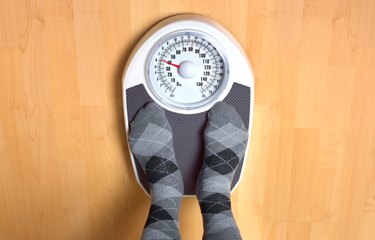
If you have a high metabolism or are recovering from illness, or if you're an older adult with little appetite, gaining weight can be as challenging as losing weight. It's best to gain weight at a moderate rate to ensure that you're not adding too much body fat and are putting on a fair amount of healthy muscle. A steady pace of 1/2 pound to 1 pound per week -- or 2 to 4 pounds per month -- can usually be achieved in a sound nutritional way. Resist the temptation to speed up the process and load up your diet with poor quality foods that may have a lot of calories but lack the nutrition to help you look and feel better.
How You Gain Weight
Video of the Day
Weight gain results when you consume more calories than you burn. A pound equals 3,500 calories, so if you add 250 to 500 calories per day, you can add 1/2 to a full pound per week. For people who are recovering from illness, such as a wasting disease, or trauma, some fat gain may be welcome. For those who want to gain weight to improve sports performance, energy and appearance, muscle is preferable tissue to gain. If you don't exercise while gaining weight, particularly with strength training, two-thirds of every pound gained is fat. Talk to your doctor about your personal weight-gain goals.
Video of the Day
Ways to Add Calories Healthfully
Choose calories from nutritionally dense foods to add weight. Increase your servings of starchy vegetables, such as sweet potatoes and corn, and fruits at meals. Proteins low in saturated fat, including lean steak, pork tenderloin, salmon, dried beans, eggs and poultry also help you add healthy calories. Calories from extra protein are especially helpful if you're actively trying to build muscle. Whole grains provide you with more nutrients than refined grains. Options such as quinoa, barley and brown rice provide fiber, B vitamins and minerals, including zinc and manganese.
Too much saturated fat can compromise your health, but unsaturated fats are a concentrated source of calories that support healthy body functioning. Find this type of fat in nuts, seeds, avocados, fatty fish and olive oil.
Planning Your Diet for Weight Gain
Eating more at meals is one strategy to gain weight. Planning snacks for between meals also helps ensure you don't go longer than two to four hours without taking in calories. A smoothie made with a banana, berries and yogurt, hummus with whole-grain crackers and a peanut butter sandwich on whole-wheat bread are healthy, high-calorie options. Alternatively, make snacks easy to grab and go. Pack a handful of trail mix, mixed nuts or dried fruit in a baggie to carry in your backpack, purse or briefcase. A 1/2 cup serving of almonds, for example, provides 410 calories; 1 cup of dried apricot halves, 300 calories; and 1/2 cup of hummus has about 200 calories.
Just a few tweaks adds calories to meals. Whole dried milk powder contains 159 calories per 1/4 cup; mix it into liquid milk, smoothies or casseroles. Sprinkle an ounce of cheese over eggs or vegetables or add a slice to a sandwich for an additional 114 calories. Increase your brown rice serving at lunch or dinner by 1 cup, and you'll take in another 216 calories daily.
Some Exercise Helps With Weight Gain
Strength training helps you add weight in the form of lean muscle. You can realistically only gain 1/2 pound of muscle per week -- or 2 pounds in a month. If you add calories and strength train, but experience greater weight gain than this, you're likely putting on fat too.
A weight-gain strength training program addresses all the major muscle groups with compound -- or multi-joint -- exercises, such as squats, presses and pulls. Use a heavy weight that allows you to eke out just four to eight repetitions in a set. One to three sets supports muscle growth in each of two to three sessions per week.
You benefit from strength training even if you're not actively trying to become a bodybuilder. Machines, resistance tubing and body-weight exercises can be used instead of heavy free weights. Cardiovascular exercise also helps stimulate your appetite and keeps your heart healthy, so do a minimum of 20 to 30 minutes at a moderate intensity daily.
- IDEA Health and Fitness Association: Gaining Weight the Right Way
- Today's Dietitian: Underweight: A Heavy Concern
- McKinley Health Center: Gaining Weight the Healthy Way
- Healthaliciousness.com: Brown Rice, Cheese, Dry Milk
- Healthaliciousness.com: Almonds, Hummus, Dried Apricots
- CNN: How Should I Eat to Build Muscle Mass?